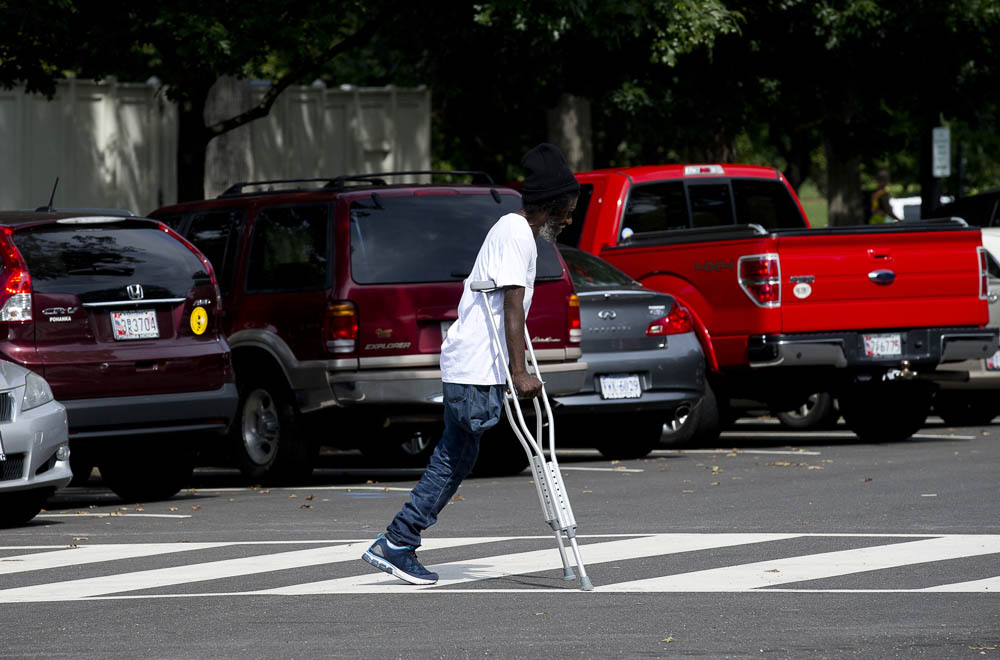
Flu vaccine research is conducted at Georgia Tech in Atlanta June 27. (CNS/Handout, EPA)
What's turned out to be a trying year for people who just want to buy affordable, reliable health insurance coverage on the open market is not over yet. As the truncated open enrollment period for the Affordable Care Act moves into its second week, Catholic health entities across the country are doing a full-court press to educate and enroll consumers, at least some of whom believe — incorrectly — that President Donald Trump has successfully killed the program.
Trump has tried his best to do just that by slashing marketing budgets, cutting HealthCare.gov hours, gutting navigator assistance programs, and reducing the enrollment period for the federal marketplace to six weeks from 12 weeks, sowing confusion and misinformation about the program's imminent demise. But Catholic health care providers and community outreach workers are pushing back, despite having fewer resources and less time to do so.
"We're just working with what we've got and doing the best we can," said Roz Hutchinson of Via Christi Health in Wichita, Kansas.
Approximately 12 million Americans currently receive their health coverage through the Affordable Care Act. It is a system so complex — with both federal and state "exchanges" or "marketplaces" through which consumers (depending on where they live, which determines the length of the enrollment period) purchase their insurance — that it comes with built-in provisions for specially trained "navigators" or certified application counselors to help consumers figure it out.
According to the Catholic Health Association, there are 649 Catholic hospitals and more than 1,600 continuing care facilities nationwide. Every day, one in six patients receives care in a Catholic hospital, with more than 5 million patients admitted during a one-year period. Catholic health care is the largest nonprofit provider of health care in the United States, with a mission to be affordable and accessible to vulnerable populations, in particular.
Serving low- and middle-income families throughout Kansas and Oklahoma, Via Christi falls under Ascension Health, which operates 141 hospitals in 22 states and the District of Columbia. In September, Via Christi began the third and final year of a federal grant from the Centers for Medicare & Medicaid Services to provide navigator services to consumers who need help choosing an insurance plan on the exchange.
"We're getting people signed up and helping them understand what screening services are covered, and which ones, given their circumstances, personal health, and risk factors, they should be taking advantage of," said Hutchinson, director of communications and public relations.
They'll do that with the aid of two full-time and four part-time certified navigators who last year reached more than 5,600 people in their service area of 13 counties.
"The schedules are already booked out weeks before open enrollment starts. Two weeks are booked solid already," said Shannon Little, oncology insurance navigation coordinator for Via Christi. "With the shortened enrollment period, we expect to be extremely busy. Considering holidays and weekends, it's really only 31 days. It's quite a short period of time to address so many people."
That's a reference to the enrollment period for the 34 states that operate exclusively under the federal exchange. This year, that ends on Dec. 15 instead of Jan. 31, as it has in previous years. States that operate their own exchanges are sticking with the later deadline.
Little's team will continue to answer questions throughout the year, she said, but the majority of their work will be done during the open enrollment period. And then?
"If they offer [another grant], we plan to apply for one," said Little. Otherwise, "we won't be able to offer the service. It will be disappointing."
The navigator program is funded through the Affordable Care Act, with navigators receiving special training to provide impartial information to consumers about health plans and what they cover, determining whether they qualify for Affordable Care Act subsidies or Medicaid and helping them enroll.
Certified application counselors work for federally designated organizations and usually act in a more limited capacity, specifically helping people enroll. Their funding comes from federal and state sources or grants other than the Affordable Care Act exchange, and the organizations are often faith-based or health centers.

A man with one leg walks across a street in Washington Sept. 26. (CNS/Tyler Orsburn)
Like Via Christi Health, the Sacred Heart Health System, a member of Ascension, in Pensacola, Florida, applied for and received federal Centers for Medicare & Medicaid Services grants to provide navigator assistance at two of its community health ministries in Texas — Centro San Vicente in El Paso and Daughters of Charity Services of San Antonio.
Their service regions include rural and special needs populations in an area of 2.7 million people, 19 percent of whom are uninsured, many with low English proficiency and literacy. This year, they will employ 24 navigators, including six temporary positions to bolster staffing during the open enrollment period; many are bilingual. Last year, their navigators reached 154,503 consumers.
"Our mission is to serve the poor and the vulnerable," said Mike Burke, who works in marketing and communications for Sacred Heart, "so the opportunity to help to ensure access to health care for everybody" through the grants was not one they could pass up. Their navigator grant took a slight hit this year, a 5 percent decrease in funding.
Overall funding for the federal navigator program for this enrollment period has been cut by an average of 41 percent. At the same time the Affordable Care Act marketing budget was reduced from $100 million to $10 million. That means there are fewer people to guide consumers through the process and less money to disseminate enrollment information.
That may be part of the reason why, according to a recent poll by the Henry J. Kaiser Family Foundation, only 18 percent of those surveyed say they've seen ads providing information on how to buy insurance under the Affordable Care Act, 60 percent don't know when open enrollment begins (or began), 48 percent believe the market is collapsing, and only about 20 percent understand that marketplace changes affect only those who buy insurance through the Affordable Care Act.
Karen Pollitz, a Kaiser senior fellow, noted that 29 percent of people think the individual mandate to purchase care is no longer in effect or don't know whether it's still in effect, which gets conflated for many people with the viability of the health care act itself. Trump's statements asserting the death of the Affordable Care Act haven't helped.
"The vast majority don't even know when they're supposed to enroll," she said.
Catholic Health Initiatives is a Colorado-based network of more than 100 hospitals in 17 states. Last year, from Nov. 1 to Jan. 31, they provided enrollment education and other advocacy assistance via 200 certified application counselors plus a dozen additional counselors dedicated exclusively to enrollment, reaching 107,000 people. Of those, 32,000 enrolled in the Affordable Care Act at a Catholic Health Initiatives facility.
Founded in 1996 by five congregations of women religious, Catholic Health Initiatives has developed an advocacy program that focuses on both national, systemic change and on local barriers — such as language, transportation, and marginalization — that prevent low-income people from accessing service.
"The origins of our advocacy program were really built on the aspirations and legacy of the sponsoring congregations and organizations," said Colleen Scanlon, Catholic Health Initiatives' longtime senior vice president and chief advocacy officer. She's seen a lot of change in 20 years, and says that Catholic Health Initiatives and entities like it are prepared to keep moving forward, with or without the Affordable Care Act, although she's hopeful it will be the former.
"I hope there's enough good will and common sense that we can really work together to do what needs to be done to ensure those who are vulnerable and historically unserved or underserved continue to be cared for," Scanlon said. "And we'll deal with the setbacks. We'll be innovative and creative to find ways to continue to serve communities in need. That's what we committed to and that's what we'll do."
The Catholic Health Association has been supporting its members as they spread the word about open enrollment — online, through social media, in-person, with informational toolkits, by any means possible. The association is partnering, through its affiliation with the Interfaith Healthcare Coalition — which includes other Catholic entities such as the Sisters of Mercy of the Americas, the Society of St. Vincent de Paul, and the Leadership Conference of Women Religious — with the lobbying group NETWORK and its #SoulstoEnroll campaign.
"We made the decision to go all in this year, since there are a lot of barriers in the way of enrollment," said Lucas Allen, a health care fellow at NETWORK, which has previously engaged with the Department of Health and Human Services on enrollment efforts. "It's an interesting situation where the administration is trying to undermine something it's supposed to be overseeing, so a lot of the burden falls on local communities, organizations, and nonprofits to do that work and get that word out."
In conjunction with Get America Covered, an outreach organization founded by health care officials who worked on HealthCare.gov’s previous rollouts, and the Young Invincibles, a Washington, D.C.-based millennial think tank and advocacy group, NETWORK has ramped up its messaging campaign, disseminating posters, flyers, postcards, fact sheets, and bulletin inserts in English and Spanish to Catholic, Jewish, Protestant and Muslim groups.
"We're trying to get local faith leaders the tools they need to be able to help enroll people, because we believe the faithful will act, helping connect people to health coverage," said Allen.
Advertisement
"This is a critical time for those we serve and we are enthused at the great energy and passion we have seen so far surrounding efforts to assist people to gain access to health care," Daughter of Charity Sr. Ellen Kron, vice president of community health ministries for Ascension Health, said in a statement. "We are committed to healthcare that leaves no one behind."
Not all Catholic faith leaders have been supportive of the Affordable Care Act because of the federal mandate that contraception be included in all health insurance coverage, whether purchased through the act or offered through employer-sponsored plans. New interim rules promulgated in October by the Department of Health and Human Services have expanded the moral and religious exemptions employers may take to avoid covering contraception.
Some see this as a religious liberty issue, while others view it through the prism of women's health.
In a Nov. 3 statement from the Diocese of Venice, Florida, Bishop Frank Dewane, who also heads the U.S. Conference of Catholic Bishops' Committee on Domestic Justice and Human Development, referenced the new mandate rules and the "possibility of new endeavors" they offer the diocese's Catholic Charities affiliate.
"Once any challenges in the U.S. Court system have been resolved, Catholic Charities Diocese of Venice, Inc. will strive to create a pathway to assist individuals and families in finding health care navigators to offer assistance in choosing affordable health insurance," the statement said.
It remains to be seen, though, whether there will still be a national health care system — the Affordable Care Act or any other — through which to navigate.
[Julie Bourbon is a freelance writer based in Washington.]








